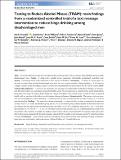Texting to Reduce Alcohol Misuse (TRAM) : main findings from a randomized controlled trial of a text message intervention to reduce binge drinking among disadvantaged men
Date
09/2018Author
Keywords
Metadata
Show full item recordAltmetrics Handle Statistics
Altmetrics DOI Statistics
Abstract
Aims To test the effectiveness of a theoretically based text‐message intervention to reduce binge drinking among socially disadvantaged men. Design A multi‐centre parallel group, pragmatic, individually randomized controlled trial. Setting Community‐based study conducted in four regions of Scotland. Participants A total of 825 men aged 25–44 years recruited from socially disadvantaged areas who had two or more episodes of binge drinking (> 8 UK units on a single occasion) in the preceding 28 days: 411 men were randomized to the intervention and 414 to the control. Intervention and comparator A series of 112 interactive text messages was delivered by mobile phone during a 12‐week period. The intervention was structured around the Health Action Process Approach, a comprehensive model which allows integration of a range of evidence‐based behaviour change techniques. The control group received 89 texts on general health, with no mention of alcohol or use of behaviour change techniques. Measurements The primary outcome measure was the proportion of men consuming > 8 units on three or more occasions (in the previous 28 days) at 12 months post‐intervention. Findings The proportion of men consuming > 8 units on three or more occasions (in the previous 28 days) was 41.5% in the intervention group and 47.8% in the control group. Formal analysis showed that there was no evidence that the intervention was effective [odds ratio (OR) = 0.79, 95% confidence interval (CI) = 0.57–1.08; absolute reduction 5.7%, 95% CI = −13.3 to 1.9]. The Bayes factor for this outcome was 1.3, confirming that the results were inconclusive. The retention was high and similar in intervention (84.9%) and control (86.5%) groups. Most men in the intervention group engaged with the text messages: almost all (92%) replied to text messages and 67% replied more than 10 times. Conclusions A theoretically based text‐messaging intervention aimed at reducing binge drinking in disadvantaged men was not found to reduce prevalence of binge drinking at 12‐month follow‐up.
Citation
Crombie , I K , Irvine , L , Williams , B , Sniehotta , F F , Petrie , D , Jones , C , Norrie , J , Evans , J MM , Emslie , C , Rice , P M , Slane , P W , Humphris , G , Ricketts , I W , Melson , A J , Donnan , P T , Hapca , S M , McKenzie , A & Achison , M 2018 , ' Texting to Reduce Alcohol Misuse (TRAM) : main findings from a randomized controlled trial of a text message intervention to reduce binge drinking among disadvantaged men ' , Addiction , vol. 113 , no. 9 . https://doi.org/10.1111/add.14229
Publication
Addiction
Status
Peer reviewed
ISSN
1360-0443Type
Journal article
Rights
© 2018 The Authors. Published by John Wiley & Sons Ltd on behalf of Society for the Study of Addiction. This is an open access article under the terms of the Creative Commons Attribution License, which permits use, distribution and reproduction in any medium, provided the original work is properly cited.
Description
This study was funded by the NIHR Public Health Research programme (11/3050/30).Collections
Items in the St Andrews Research Repository are protected by copyright, with all rights reserved, unless otherwise indicated.

